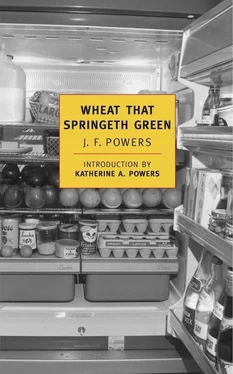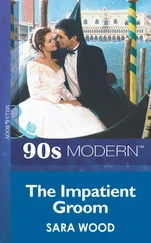J. Powers - Wheat That Springeth Green
Здесь есть возможность читать онлайн «J. Powers - Wheat That Springeth Green» весь текст электронной книги совершенно бесплатно (целиком полную версию без сокращений). В некоторых случаях можно слушать аудио, скачать через торрент в формате fb2 и присутствует краткое содержание. Год выпуска: 2000, Издательство: NYRB Classics, Жанр: Современная проза, на английском языке. Описание произведения, (предисловие) а так же отзывы посетителей доступны на портале библиотеки ЛибКат.
- Название:Wheat That Springeth Green
- Автор:
- Издательство:NYRB Classics
- Жанр:
- Год:2000
- ISBN:нет данных
- Рейтинг книги:5 / 5. Голосов: 1
-
Избранное:Добавить в избранное
- Отзывы:
-
Ваша оценка:
- 100
- 1
- 2
- 3
- 4
- 5
Wheat That Springeth Green: краткое содержание, описание и аннотация
Предлагаем к чтению аннотацию, описание, краткое содержание или предисловие (зависит от того, что написал сам автор книги «Wheat That Springeth Green»). Если вы не нашли необходимую информацию о книге — напишите в комментариях, мы постараемся отыскать её.
Wheat That Springeth Green — читать онлайн бесплатно полную книгу (весь текст) целиком
Ниже представлен текст книги, разбитый по страницам. Система сохранения места последней прочитанной страницы, позволяет с удобством читать онлайн бесплатно книгу «Wheat That Springeth Green», без необходимости каждый раз заново искать на чём Вы остановились. Поставьте закладку, и сможете в любой момент перейти на страницу, на которой закончили чтение.
Интервал:
Закладка:
5. ORDAINED
JOE HAD BEEN in the congregation the last time a new priest celebrated his first Mass in the parish church. That was some years back, but there hadn’t been a change of pastors. So Joe — and doubtless Toohey — knew what to expect when they reported to the rectory that Saturday night, to hear Father Stock’s arrangements for the next morning.
“Now, you, Michael”—Toohey—“will have the ten o’clock, and you, Joseph, the eleven. And as is the custom here”—and, to Joe’s knowledge, nowhere else in the diocese—“a special collection will be taken up by the new priest, or priests. What I mean is, since you’ll serve each other’s Mass and are both priests — don’t worry, I’ll make that clear to the congregation — server will help celebrant take up the special collection. That way, we’ll save time. Any question?”
Just one, Joe thought, Why?
“No questions. Good. Now, right after the regular collection (to be taken up by the ushers, of course), the two of you’ll come down from the altar. The communion rail gate will be open, an usher waiting for you there with the baskets. Celebrant takes one, server the other. Celebrant does one side of the middle aisle, server the other. Now you’re at the back of the church — go over to the side aisles, celebrant to one, server to the other. Remember, the two middle sections are wide and you’ve only done half of these — you still have the other half to do from the side aisles. (I’ve known ushers to forget this.) But don’t start at the back of the church, don’t come up behind people. Go to the front of the church and work back as before, so people can see you coming. The same when you do the side sections — go to the front and work back. When you’ve done those sections, come up the middle aisle together . Leave the baskets at the communion rail, on the other side, the altar side. Don’t worry, someone’ll come out of the sacristy and take the baskets away before Communion. Well, that’s about all. Any questions?”
“Just one. Why?”
“ Why , Joseph? Why what ?”
“Why should we take up the collection?” Joe looked to Toohey — foolishly, he saw — for support.
“‘ We ’?” said Father Stock. “Does Joseph speak for you, Michael?”
“No,” Joe said, dissociating himself from Toohey before Toohey did it for him. “I don’t speak for myself, either. I speak for the Church.” Wham!
From the walls of Father Stock’s office, the photographs — mostly group pictures of clergy at class reunions and annual retreats, but a few individuals, bishops and popes — watched and waited, as Joe did, to see what would happen next.
Toohey stood up. “I’ll run along, Father, if that’s all.”
Father Stock nodded. “Be in the sacristy early tomorrow, Michael. Good night.”
So Toohey, who was being sent to Rome for further study, which could mean he’d be a bishop someday, left, and Joe, who was being sent to a parish as a curate, which could mean he’d be a pastor someday, sat tight.
Father Stock answered the phone—“Eight-nine-ten-eleven-it’s-in-the-parish-bulletin”—and hung up. “All right, Joseph. I’m listening. Speak for the Church.”
“Maybe I shouldn’t have said that, Father. But for us to take up the collection is to cheapen the Mass and the priesthood, I say.”
“I wouldn’t say that.”
“Well, I would, and I don’t think I’m alone.” The clergy on the walls, even the bishops and popes who’d frowned when Joe spoke for the Church, were now all for him, especially the dead ones. “Father, won’t it look like we’re cashing in on the occasion? Or that you are?” Wham!
“I’ll make it clear that you aren’t.”
Joe had to like the man for that. Even vice, it seemed, in this case greed, could bring out the good in people. But the man was still wrong. “Father, maybe I shouldn’t ask this, but what do you — what does the parish , I mean — stand to gain? Three hundred dollars? Four hundred? Five?”
Father Stock seemed to think it a fair question, no more than one priest might ask another, and replied with unconcealed regret, “Not five.”
Joe was reluctant to go on, to say what he had in mind, afraid the man would be stung by it and sting back, which was how Joe himself might respond to what he had in mind — which, though, was well calculated to free the man’s will (temporarily) from its long enslavement to merely monetary considerations, enabling him not only to do the right thing but to profit by it. How often, here below, did such an opportunity arise? “Father, I have some money from my folks to buy a car — I’ll need one now that I’m ordained — but I don’t care what I drive. So what would you say — what would the parish , I mean, say — to five hundred?”
Father Stock said, gravely, “The parish is always happy to accept an offering made in good faith, without qualifications. Be in the sacristy early tomorrow, Joseph. Good night.”
Joe was in the sacristy early the next morning, before Toohey, and put away the vestments for Father Stock’s assistant, who’d had the nine o’clock and who, on leaving the sacristy, said, “Don’t take any wooden nickels.” But Joe looked on the bright side and hoped that his proposal — his exalted but not exaggerated regard for the Mass and the priesthood — had disturbed Father Stock’s sleep, had perhaps so disgusted the man with himself that he’d decided to call off the special collections, or, if not, to employ the ushers. It even occurred to Joe, when Father Stock and Toohey entered the sacristy together, that Toohey had already been told the good news (that the special collections were off, at least as far as the new priests were concerned), and that the situation, though it could perhaps no longer be improved by an offering from Joe, was still intended to teach him a lesson in faith and hope, in both of which he’d been found wanting, as he would in charity too unless he acted blindly, swiftly, before it could be construed as payola.
“My offering, Father. It’s made in good faith, I hope, but anyway without qualifications.”
Father Stock accepted the unsealed envelope with a nod, but didn’t peek inside or pull out the check, jump up and down, and yell “Yea!”—just put it aside, on the counter of the many-drawered cabinet in which vestments were kept flat, and got busy with the water and wine cruets, topping them up.
Joe — he’d expected something more reassuring than a nod — slipped into his surplice and cassock. He’d brought his own, rather than take a chance on what the sacristy might stock in his size, Men’s 36 short, and maybe wind up in snotty, not to say boogery, altar boys’ issue. And before Father Stock, now lighting candles on the altar, returned to the sacristy, Joe asked Toohey, “Did the man say anything about the special collections?”
“Grow up,” said Toohey, the fink.
Father Stock returned to the sacristy, checked his pocket watch, and gave the word. “Now.”
Server left the sacristy, ringing the bell in the pierced brass globe by the door (but not pulling it down), and led celebrant to the altar, “ Introibo ad altare dei ,” and so the ten o’clock began.
Celebrant, like server, had practiced saying Mass in the chapel at the sem, but celebrant, unlike server, was a born master-of-ceremonies type, his command of rubrics daunting in the classroom, likewise his quarterbacking, his finger-snapping at rites in the chapel, and so celebrant was in his element.
When it was time for the sermon, celebrant and server settled down on the sedilia, while preacher (Father Stock) came out of the sacristy and climbed into the pulpit. He read the announcements, the last one to the effect that both celebrant and server were newly ordained priests and former members of the parish — nothing about special collections. The sermon, though predictable (happy the parish that gives God and the Church two new priests in a single year, their high calling a difficult one in times like these), was, like the announcements, suspenseful, but like them, in the end, gratifying — nothing about special collections.
Читать дальшеИнтервал:
Закладка:
Похожие книги на «Wheat That Springeth Green»
Представляем Вашему вниманию похожие книги на «Wheat That Springeth Green» списком для выбора. Мы отобрали схожую по названию и смыслу литературу в надежде предоставить читателям больше вариантов отыскать новые, интересные, ещё непрочитанные произведения.
Обсуждение, отзывы о книге «Wheat That Springeth Green» и просто собственные мнения читателей. Оставьте ваши комментарии, напишите, что Вы думаете о произведении, его смысле или главных героях. Укажите что конкретно понравилось, а что нет, и почему Вы так считаете.












